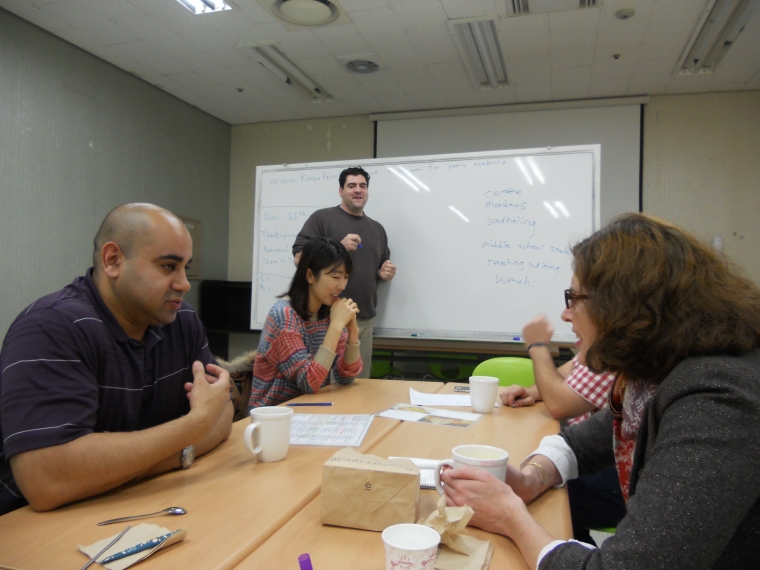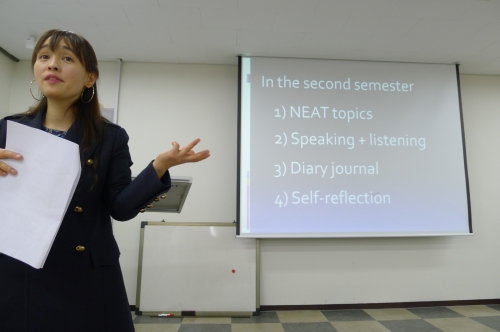You know that feeling when everything comes together at the right moment? I’m experiencing one of these moments right now.
A year ago I was asked if I was interested in organizing a “branch” of the KOTESOL Reflective Practice (RP) Special Interest Group (SIG) in Daegu. I said no. I just didn’t have the space in my life, so I turned down the idea.
Well, last Saturday, with the inspiring support (and nudging) of my friend and colleague KongJu (Princess) Suh, I facilitated our first Daegu RP-SIG meeting. A year after the initial request, the moment was right. There are some things that are just stronger than you, and the energy of the reflective teacher’s community here in Korea is one of these things.
Over a year ago, the RP-SIG was created by Michael Griffin (Mike), Manpal Sahota and Kevin Giddens. Since then, the Seoul RP-SIG, along with Daejeon’s group, has been very successful in raising the awareness of teachers from all professional backgrounds about the concept of reflective practice. Although I’ve supported the SIG by presenting about reflection at a few conferences, the more I heard about what was going on during the monthly meetings, the more excited I got about starting something in Daegu.
what’s the RP-SIG all about?

In his article, The Reflective Practice SIG: What Is It? How
Can It Help You?, in the Spring 2012, TEC (The English Connection) News, Mike gives us a clear image of the SIG’s vision.
It seems to me that professional development often amounts to one person at the front of the room telling others how and why they should do something. In the RP-SIG, we try to get away from that and have members come to their own conclusions about their own teaching practices. It was with this vision of professional development in mind that we held the first RP-SIG meeting in February, 2011. The RP-SIG’s purpose is (a) to challenge our perceptions of who we are and what we do, (b) to build strategies to become a more aware educator, and (c) to share and learn through each others’ experiences and beliefs.
Challenging perceptions? Becoming a more aware educator? Sharing and learning through experiences and beliefs? Who wouldn’t want to be part of such a rich community? Mike definitely makes a convincing case for anyone who wants to start such a community of teachers.

This community is what my nudger, Princess, was hoping to see in Daegu. One evening in March over dinner — after we had spent a few hours working on the presentation she was going to give on how to teach writing to high school students — Princess shared her dream of starting a group where English teachers could come together and talk about teaching. At this point, I was more keen about the idea of launching the SIG. We talked and got quite excited about it. But we wanted to be sure we could give it our all, so we decided to think it over and make it happen when the time was right. Three weeks ago, Princess called me and the plans for last Saturday were set in motion.
Model of an RP-SIG meeting
Knowing about Mike’s success in facilitating the Seoul RP-SIG meetings, I wanted to follow his model. He shares the meeting’s structure in the TEC News:
A typical RP-SIG meeting consists of four parts: (a) ice-breaker – an interactive warming up session to break the ice, (b) check-in – groups of 3 or 4 discuss personal reflective goals, (c) discussion – facilitator leads group discussion to promote reflective practice, and (d) check-out – reaffirmation of personal goals and direction. We hope that members can take the ideas, thoughts, and experiences from the meetings and transfer them to their own contexts.
Since it was our first meeting, the nine teachers in attendance checked-in by introducing themselves and explained a bit about why they wanted to be part of the SIG. A few said they felt like they were becoming lazy in their teaching practices and wanted to feel better about teaching.
We then moved into the discussion part of the meeting where I decided to follow the model I had presented about a few weeks earlier (see An Image of Reflection: learning from my RP workshop). In pairs, we each shared a teaching/learning moment and explored it via the Experiential Learning Cycle. Our partner’s role was to help keep us focused by asking questions that pertained to each stage (ie: description stage – How many students were there? How big is the class? Was it a hot day?). Between each stage we regrouped and discussed how we felt about the process. This was extremely rich in that it allowed us to get a deeper understanding of the process while also getting a deeper understanding of our teaching/learning moment.
The meeting ended with the check-out. We made reflection goals for the month, shared them with each other, and decided we would share the results of our goal regardless of whether or not we were able to accomplish it. The important point is we are here to support each other as reflective teachers no matter what the results.
The beginning for us, how about for you?
So this is the beginning of our reflective community in Daegu! I’m very excited to see where we will go, but more importantly I’m very happy to be part of the larger RP community. Throughout its first year, the RP-SIG has been incredibly supportive, inspiring, and motivating. Teachers now have a place where they can share their experiences and expand there ideas in a safe environment.
I hope this post has given you more clarity on what a reflective teaching community can look like. Maybe you are now also inspired to start your own group. The reflective vibe is quite contagious. If you do decide to start a group, let us know! We’d love to help you out.

Hi Josette,
As I mentioned, I’ve been trying to find time to get you a comment on this for ages – so sorry ;-) But, here it is now ;-)
I LOVE what you and the guys are doing in Korea – what that every country on the planet had a group like yours…in every city ;-)
I’ve often said that LEARNing is (or should be) the “engine” of EDUcation…but the “fuel” needed to power this engine is REFLECTION. As a profession, we are starting to see this – and groups like yours are showing us how much more effective we can be when we grow as “THINKing DOers” – not simply “doers” ;-)
However, we also need to be thunking about how we bring this type of practice into our classrooms more…to our LEARNers. LEARNing-by-LISTENing can be greated enhanced when we focus on LEARNing-by-DOing…and this, in turn, can be put “on steroids” when we incorporate LEARNing-by-THINKing-and-REFLECTing…
Now, some might say we cannot do this with “kids” – Rubbish – “kids” are exactly the “people” we should be doing this with ;-)
Keep up the GREAT WORK…keep getting these GREAT POSTS out there…you never know, we might actually start “winning”!
Take care,
T..
LikeLike
I know I have already thanked you in an email many eons ago, but I want to thank you again. Thank you for supporting our LEARNing! Hard to believe it’s been three years since we started this group, and I think 3 years since we met in the wonderful world of Twitter. I hope all is well with you!
LikeLike
Hi Josette, there’s discussion on the Busan KOTESOL fb page about setting up a similar group so this post is great and very useful! I’ve put a link to your blog on the fb page, hope that’s ok! Gemma.
LikeLike
I’m very happy to hear my post may be helpful to you and a potential RP community in Busan. Never hesitate to share my blog with anyone. Let me know how it goes! Happy reflecting!
LikeLike
Double that thanks josette! I also made sure to look up mikes article again. With your help and the rest of the community I’m sure we’ll make a productive and supportive little community for ourselves in Busan.
LikeLike